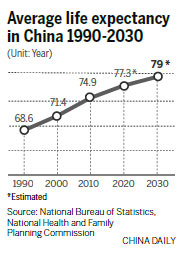Conference will encourage healthier lifestyles
Shanghai will host the 9th Global Conference on Health Promotion from Nov 21 to 24, aiming for high-level advocacy for health advancement by all social sectors worldwide, the country's top health authority and the World Health Organization announced on Monday.
It demonstrates again the strong commitment of China's top leadership to people's health, said Song Shuli, spokeswoman for the National Health and Family Planning Commission.
Last month, the Communist Party of China Central Committee and the State Council issued the "Healthy China 2030" blueprint, which vows to assure residents equal access to basic health services by 2020.
It also requires all government departments to help promote health.

Bernhard Schwartlander, WHO representative in China, said: "China's leaders understand that health and sustainable development are two sides of the same coin. We look forward to seeing ministers, mayors and other leaders come together to grapple with some of the key issues, such as rapid urbanization, the increasing burden of chronic, lifestyle-related diseases and the need for innovation in how we tackle these challenges."
Mao Qun'an, publicity chief of the commission, said they are expecting more cross-department cooperation to promote public health.
He said the commission is working with more than 10 ministries, including the Ministry of Education and the General Administration of Sport, to launch a nationwide campaign on promoting healthy lifestyles to raise people's awareness of health and how to prevent chronic diseases.
Incidences of major chronic diseases, such as hypertension and diabetes, have been rising in China in recent years, and chronic diseases have become the major cause of death for Chinese, the commission said.
"Forming a healthy lifestyle is easier said than done," Mao said. "We hope that with the multi-departmental efforts, everyone can start to have a healthy lifestyle."
Dai Zhengshe, director of the Shaanxi Provincial Commission for Health and Family Planning, said international experience has shown that healthy lifestyles contribute much more to reduced incidences of chronic diseases than expensive medical treatment.

























